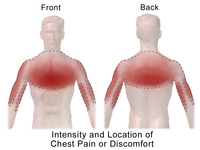
Photo from wikipedia
Aim: The aim of this study was to evaluate the prevalence of gastrointestinal disorders in non-cardiac chest pain (NCCP) Iranian patients. Background: Gastro-esophageal reflux disease (GERD) is the most common… Click to show full abstract
Aim: The aim of this study was to evaluate the prevalence of gastrointestinal disorders in non-cardiac chest pain (NCCP) Iranian patients. Background: Gastro-esophageal reflux disease (GERD) is the most common cause of NCCP, which accounts for about one third of cases. Methods: This was a descriptive study on consecutive NCCP patients who referred to the gastroenterology clinic at the Taleghani Hospital, Tehran, Iran from 2015 to 2017. Medical history, physical examination and esophageal test including upper gastroenterology (UGI) endoscopy, esophageal manometry and 24 hour ambulatory esophageal pH monitoring were done for each participant. Results: The study included 102 patients, of which 58.9% were women, and the mean age of patients was 41.5 ± 11.2 years. The most common symptoms associated with chest pain were regurgitation in 28.4%, dysphagia in 23.5% and heartburn in 19.6% patients. UGI endoscopy was abnormal in 29.4% cases, esophageal manometry was abnormal in 61.7% cases and ambulatory pH monitoring was abnormal in 37.2% patients. Using UGI endoscopy and combined 24-h pH monitoring determined the prevalence of GERD 44.1% , and based on manometry the most frequent causes of NCCP was ineffective esophageal motility (IEM) in 19.6% patients with NCCP. Conclusion: Detecting etiology of NCCP allows healthcare providers to assure patients of the benign nature of their condition and provide appropriate treatment. It can also help prevent excessive hospital and physician visits as well as the costly and potentially risky testing which often results.
Journal Title: Gastroenterology and Hepatology From Bed to Bench
Year Published: 2018
Link to full text (if available)
Share on Social Media: Sign Up to like & get
recommendations!